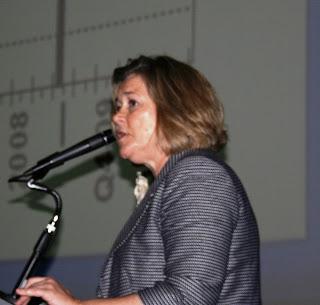 Leslie Appleton-Young, chief economist for the California Association of Realtors, gave her 2011 California Market Update today (December 8th) at the ArcLight Cinema in Sherman Oaks. More than 150 Rodeo Realty agents and employees attended the event.
Leslie Appleton-Young, chief economist for the California Association of Realtors, gave her 2011 California Market Update today (December 8th) at the ArcLight Cinema in Sherman Oaks. More than 150 Rodeo Realty agents and employees attended the event.The short version of her presentation on what’s to come for the economy next year: “We’re kind of stuck and there’s not strong momemtum to make 2011 much different,” said Appleton-Young.
The economy is recovering, she said. But high unemployment is preventing the recovery from gaining momentum. Consumer confidence is bouncing along at a lackluster rate. Consumer spending remains quite low. And while inflation isn’t much of an issue today, it may be a bigger issue in the future.
Fixing California’s financial problems is also likely to involve more layoffs in the state.
There continues to be a disconnect between high-end list prices and sales prices, she said. Some high-end markets, such as Malibu and Beverly Hills, have supplies in excess of 10 months. Inventory is tighter in some of the lower-end markets.
Short sales are closing, but banks need to do more to speed up the process, said Appleton-Young. And distressed properties will continue to play a large roll in many markets. Agents need to understand what type of market they’re working in, either a distressed one or others.
The median home price in California is forecast to increase 2 percent, according to Appleton-Young.
She encouraged agents to leverage technology in the coming year, and get involved in the issues. A few of her reading recommendations for 2011 include: “Crisis Economics” by Nouriel Roubini; “Delivering Happiness” by Tony Hsieh; “Switch” by Chip and Dan Heath; “Linchpin” by Seth Godin; and “What Would Google Do?” by Jeff Jarvis.
To see Appleton-Young’s slides from the presentation, visit the following link. Please be patient, because it takes about a minute for the presentation to open: